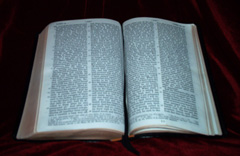
Showers Of Blessing
Four Leprous Men
2 Kings 6:24-7:20.
I was affected by the exercises that come into this section, dear brethren. Reference has been made lately to the fragile condition of the testimony, the smallness of things, and at the end of 2 Kings 6, we read of such conditions. The testimony is besieged by the Syrians and various elements are working — the king, this woman, Elisha and the elders with him, and in chapter 7, the captain on whose hand the king leaned. But it is all in view of the prophetic word coming to pass: "Tomorrow about this time shall the measure of fine flour be at a shekel, and two measures of barley at a shekel, in the gate of Samaria." This prophetic word comes into this section where the testimony is under siege.
In chapter 6, verse 25, we read that "there was a great famine in Samaria." Food becomes very costly and of poor quality: an ass's head and a fourth part — a small part — of a cab of dove's dung. What a contrast to "a measure of fine flour and two measures of barley", speaking of the Lord Jesus Christ, which we have in the prophetic word! We read in Leviticus 2 of the fine flour of the oblation. Then, two measures of barley: Ruth and Naomi come to Bethlehem in the beginning of the barley harvest, and find a relation of Naomi's who was "a mighty man of wealth"! Well, this is the prophetic word in a day when the testimony was besieged by the king of Syria. What a comfort it is to our hearts, that all the exercises God brings in are measured. The Lord says to Smyrna, "Thou shalt have tribulation ten days." God's disciplinary ways with His people are all measured.
So the king here looks very humble: "behold, he had sackcloth within upon his flesh." But he says, "God do so, and more also to me, if the head of Elisha the son of Shaphat shall remain on him this day!" A spirit of murder was brought out in this king! And then "the captain on whose hand the king leaned" is not marked by faith. He does not believe the prophetic word. Well, a time of crisis brings out where we are in our relations with God. The king says, "why should I wait for Jehovah any longer?" I believe the Lord is showing where each one of us is in our relations with Him.
These four lepers "at the entrance of the gate" were, we may say, despicable persons. But these four leprous men are marked by exercise. They are thinking of life. They say, "And now come, let us fall away to the camp of the Syrians: if they save us alive, we shall live." Life was their concern, and they moved in a time when matters were not clear. It was dusk. "They rose up in the dusk to go to the camp of the Syrians." So, dear brethren, there may be a time between the siege of the king of Syria and the time that follows: "Tomorrow about this time" when the measure of fine flour is at a shekel, and two measures of barley at a shekel. There may be a time, when it is dusk, when the exercise of the four leprous men comes to light. "And they rose up in the dusk to go to the camp of the Syrians." We have read of their exercises all through this chapter. They come and eat. Well, they need food, but then they need to be adjusted and are ready to be adjusted, prepared to judge themselves. They say, "We are not doing right; this day is a day of good tidings, and we hold our peace." "And now come, let us go and tell the king's household." We may be in a time when matters are not fully clear. This scripture speaks of dusk, but the prophetic word is, "Tomorrow about this time shall the measure of fine flour be at a shekel, and two measures of barley at a shekel, in the gate of Samaria." The administrative side is seen in "the gate of Samaria." The testimony was in reproach when the Lord Jesus suffered "without the gate!" These four men are in the testimony, in reproach. They would not be considered men of any value. Yet, though they are outside the city and the prophetic word of Elisha is in the city, they really link on with the prophetic word in what they do — they bring word that the Syrians have fled and that there is food available.
Oh, may we be prepared to be like these four leprous men! And may the Lord help us to believe. This captain on whose hand the king leaned says, "Behold, if Jehovah should make windows in the heavens, would such a thing be?" Ephesians 3:20 has come before me much recently: "To him that is able to do far exceedingly above all which we ask or think, according to the power which works in us." Let us lay hold of this verse and not be like this captain, who says, "if Jehovah should make windows in the heavens, would such a thing be?" It is possible, and God is able! For the Lord's name's sake.
S. E. Hesterman
Scotch Plains, New Jersey, USA. February 9, 1993.